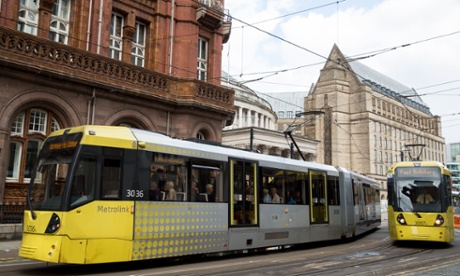
The prime minister has welcomed an ambitious proposal to devolve power to UK city regions along the same brisk timetable as the Scottish devolution process, suggesting Greater Manchester and West Yorkshire could gain more autonomy in 2015.
The report from the City Growth Commission argues that devolution from Whitehall to city regions will boost economic output in the UK’s 15 largest metropolitan areas (“metros”) by £79bn per year – approaching 5% of current GDP.
It also proposes a vastly improved transport network in the north of England across the Pennines, including a northern answer to London’s Oyster card – dubbed the “Noyster”.
Praising the report as “absolutely first class”, David Cameron told Prime Minister’s Questions on Wednesday that there was a “real opportunity” to rebalance the economy using high speed rail and other infrastructure to “link up our great northern cities” and create a “northern powerhouse”.
The City Growth Commission says an independent committee should be established to draw up plans for what it calls “devo met”. This would run in parallel to the “devo max” committee led by former foreign secretary William Hague, which is trying to reach a constitutional settlement to give Scotland more autonomy following the referendum.
The “devo met” group should draw up draft legislation for enabling powers by January 2015, just as Hague’s will. That would allow any financial and/or fiscal settlement to be a central part of the 2015 comprehensive spending review, according to the report’s authors.
The City Growth Commission is led by Mancunian Jim O’Neill, the outgoing chairman of Goldman Sachs Asset Management and a confidant of the chancellor, George Osborne. Speaking at the report’s launch at the RSA in London on Wednesday, O’Neill cheerfully accused Osborne of “stealing” many of the commission’s ideas when setting out his vision this summer of a “Northern powerhouse” made up of interconnected cities along the M62 corridor – a region of seven million people referred to as ManSheffLeedsPool by O’Neill. Osborne has made clear that handing power and money to the most competent local authorities and universities will be at the heart of his autumn statement in December.
O’Neill’s report argues that cities, particularly those in the north of England, need to get over their rivalries and work together if they are to be entrusted with more power over spending.
While the report was welcomed by business people and political leaders in the 15 “metros” singled out in the report (London, Greater Manchester, West Midlands, West Yorkshire, Glasgow, Merseyside, Tyne and Wear, South Yorkshire, East Midlands, South Hampshire, Edinburgh, Cardiff, Bristol, Belfast and Leicester), others were less impressed.
Stephen Brady, leader of Hull city council, said: “I’m really, really disappointed that Hull once again has been overlooked in favour of the bigger cities. We’re like the forgotten city, despite being strategically so important. The population of Hull is 265,000, but if you add in East Riding it’s at least half a million. We’ve attracted over £400m of investment in the last year, including the new Siemens wind turbine plant and the Reckitt-Benckiser research and development facility. We’ve won the City of Culture 2017 bid. What else can we do to prove that we want to be given the chance to run things ourselves?”
Marko Cereste, leader of Peterborough city council, said he had been lobbying O’Neill’s team all year to argue “big isn’t always beautiful”. “I think that small cities can implement new ideas quicker, more effectively and probably more effectively than big cities. What I don’t want is for London to be hugely successful south of us, Birmingham, Manchester and Leeds successful above us, sucking the life out of Peterborough in the middle.”
Colin Glover, leader of Carlisle council, said his city faced being squeezed by an ever more powerful north-west and north-east England, with Scotland getting more powers just eight miles to the north. “There’s a general feeling that Carlisle isn’t seen as having the same status as some of the big cities, which gives me some cause for concern. We need to make a lot of noise to make sure we are not forgotten,” he said.
Richard Carter, leader of Yorkshire First, a political party which wants independence for God’s Own County, dismissed O’Neill’s proposals as “divisive, undemocratic and limited.” He said: “Yorkshire is its cities, towns and villages. We don’t see any advantage in creating islands of devolution in Yorkshire. By concentrating on a limited number of ‘metro areas’, places like Hull, the East Riding and North Yorkshire miss out.”
The new report, called Unleashing Metro Growth, says that apart from London, only Greater Manchester and West Yorkshire are currently ready for substantial devolution.
Both currently have a “fiscal gap” – a discrepancy between their attributable tax revenues and their level of public expenditure. Greater Manchester – the UK’s second largest metro area, with a population of 2,894,240 according to the 2011 census – takes £4bn–5bn more from the Treasury than it contributes. But the report argues that such underperformance could be addressed by entrusting these city regions with big budget and policymaking flexibilities: to be handed more control over housebuilding, planning and transport, as well as a string of property taxes, better rail links and super-fast broadband.
Speaking at the report’s launch, Lord Heseltine, former deputy prime minister and a longtime champion of city devolution, said the Scottish referendum had shown that the public are fed up with so much power being centralised in Whitehall.
“The agenda is centre stage. The time is now. There is no way in which, in my view, the House of Commons is going to pass Scottish devolution processes unless there is a fair settlement for England of a devolutionary nature,” he said, adding: “The country will gain immeasurably from a determined attempt to achieve this new way of running the country. I say ‘new way’, but we actually did run this country that way when we became the great imperial power that we are.”













